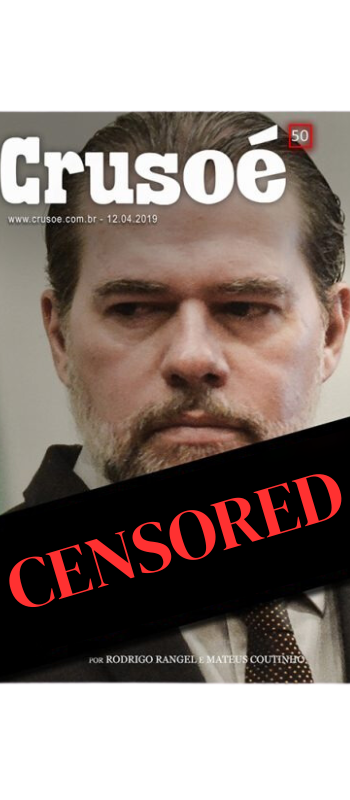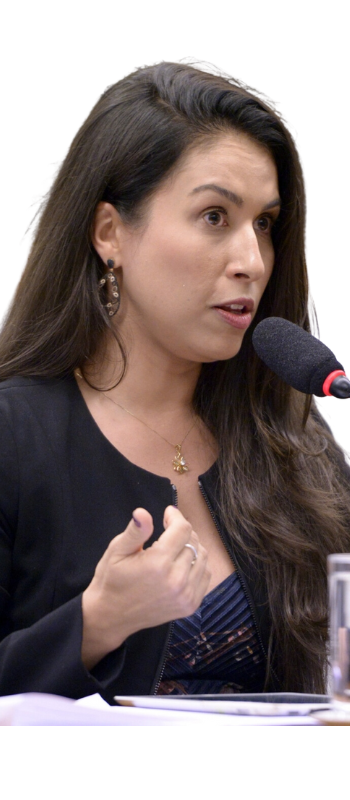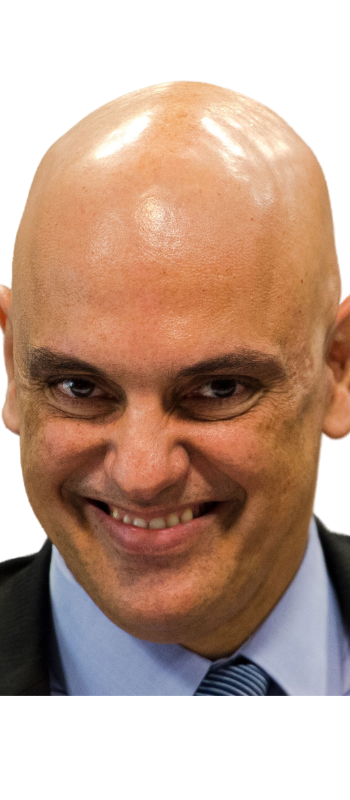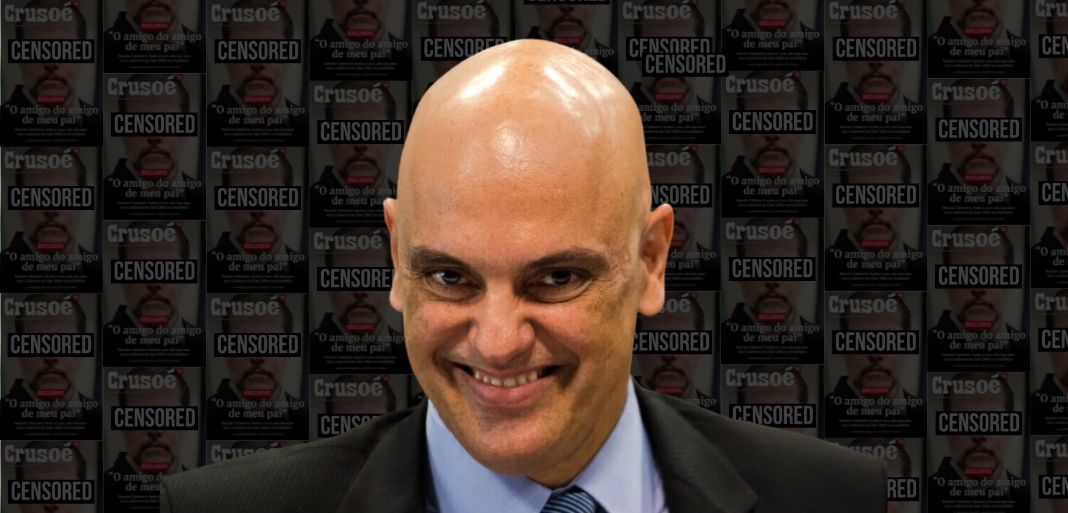In 2016, Brazil faced one of its most politically turbulent moments, engulfed in an unprecedented economic crisis and the largest corruption scandal in its history. Amidst this turmoil, President Dilma Rousseff (PT) was undergoing impeachment proceedings, with Michel Temer (MDB) poised to assume the presidency. In April of that year, an attempted fraud targeting Temer’s wife, Marcela Temer, inadvertently paved the way for the rise of censorship in the country.
According to official reports, Silvonei José de Jesus Souza, a roofer who had acquired a pirated hard drive containing user data from a journalistic portal, including Marcela Temer’s information, cloned her cell phone. He then attempted to extort her family, threatening to release intimate photos stored in the cloud. At the time, Michel Temer, still Vice President, contacted Alexandre de Moraes, the Secretary of Public Security for São Paulo. Moraes acted swiftly and discreetly, arresting Silvonei within days. Despite the relatively minor nature of the crime, Silvonei was sentenced to 5 years and 10 months in a prison notorious for housing high-profile criminals.
This incident solidified Temer’s trust in Moraes. Nine months later, Temer assumed the presidency, and soon after, a plane carrying Teori Zavascki, a Supreme Court minister, tragically crashed into the sea near Paraty.
This tragedy opened a vacancy in the Supreme Court, and Temer’s choice to fill it was Moraes, marking the beginning of one of the most unbalanced periods in Brazil’s tripartite system.
March 14, 2019 – Start of the Fake News Inquiry

The Fake News Inquiry, initiated in March 2019 by the Supreme Federal Court (STF), is an investigation aimed at addressing the spread of false news, attacks, and threats against the Court’s ministers and other authorities. The inquiry was started by the then-president of the STF, Dias Toffoli, and is reported by Minister Alexandre de Moraes. From the inquiry, Moraes decreed the blocking of accounts on various social media platforms, including the then Twitter. Generally, those targeted were disseminating criticisms of the Supreme Federal Court.
April 15, 2019 – Censorship of Crusoé Magazine and the O Antagonist site

Just one month after the inquiry began, on April 15, in one of the most inappropriate decisions in the history of the Supreme Federal Court, Moraes demonstrated the true intentions of the court with the inquiry.
A report by Crusoé Magazine and the O Antagonist site, both significant journalistic portals in the country, was censored and taken offline by Moraes’s decision.
The piece in question cited a plea bargain document within the scope of Operation Car Wash, in which Toffoli was referred to by the nickname “the friend of my father’s friend,” allegedly given to him by executives from the Odebrecht construction company.
Five years later, Toffoli annulled all proceedings against Marcelo Odebrecht, then president and architect of the largest corruption scandal in the country’s history.
July 2020 – Blocking of Social Media Profiles

In July 2020, Alexandre de Moraes intensified the actions of the Fake News Inquiry by ordering the blocking of social media profiles of several supporters of then-President Jair Bolsonaro. The blocked accounts belonged to figures who, according to investigations, were involved in disseminating misinformation and systematic attacks against the STF and other democratic institutions. The measures covered platforms such as Twitter, Facebook, and Instagram, both in Brazil and abroad, sparking a wave of criticism that pointed to potential abuse of power and restriction of freedom of expression.
Moraes justified these actions as necessary to contain what he considered a threat to democratic order, highlighting the role of social media in amplifying extremist and false discourses. However, this decision reinforced accusations that the inquiry was being used to suppress legitimate criticisms of the Supreme Federal Court. The controversy surrounding these blockages still resonates in public debate, particularly concerning the balance between protecting institutions and preserving individual freedoms.
November 2021 – Allan dos Santos Case

In November 2021, Alexandre de Moraes ordered the blocking of social media accounts of blogger Allan dos Santos, one of the main targets of the Fake News Inquiry. Allan dos Santos, founder of the Terça Livre channel, was accused of promoting misinformation and inciting attacks against democratic institutions, including the STF. Moraes’s decision went beyond blocking accounts; he also issued a preventive arrest warrant against Santos, who had already taken refuge in the United States by that time.
October 2022 – Ludmila Case and Allan dos Santos’s Fundraising

In October 2022, within the scope of the Fake News Inquiry, Alexandre de Moraes ordered the investigation and blocking of bank accounts of individuals who had contributed to an online fundraising campaign aimed at supporting Allan dos Santos, who was in exile in the United States. The action was justified by suspicions that the funds were being used to finance illegal activities, including maintaining a structure of misinformation and attacks against democratic institutions.
The situation gained even more notoriety with the inclusion of Judge Ludmila Lins Grilo among the targets of this measure. Ludmila, known for her criticisms of the Supreme Federal Court and her defense of freedom of expression, was identified as one of the donors to Allan dos Santos’s fundraising. The blocking of her accounts and the investigation into her contribution were widely criticized, being interpreted by many as an example of political persecution and an attempt to silence dissenting voices.
Ludmila was removed from the judiciary by the National Council of Justice (CNJ) and went into exile in the United States
November 2022 – Blocking of Parliamentarians’ Accounts

In November 2022, the Brazilian Superior Electoral Court (TSE) took decisive action by issuing orders to block the social media accounts of several parliamentarians, as part of its broader strategy to curb disinformation during the election year. This crackdown particularly targeted politicians from opposition parties, during a period marked by intense political rivalry following the election of President Lula.
One prominent victim of these blocks was Nikolas Ferreira, who at the time was the most voted federal deputy in the country, securing 1.47 million votes.
February 2024 – Arrest of Filipe Martins

In February 2024, the Federal Police executed the preventive arrest order issued by Moraes within the scope of Operation Tempus Veritatis. The operation investigated the connections between Martins and other public figures with the events of January 8, 2023, which culminated in attacks on the headquarters of the Three Powers in Brasília, as well as an alleged attempt at a coup d’état. The initial allegation for Martins’s arrest was the supposed trip he had made to the United States on December 30, 2022, on a presidential flight with Jair Bolsonaro. Martins’s presence on this flight, according to authorities, indicated a risk of flight, justifying the preventive arrest. However, Martins’s defense promptly presented evidence proving his presence in Brazil during the alleged period. These proofs included airline tickets from Brasília to Curitiba, baggage check records, and photos of the couple in the region of Ponta Grossa, Paraná, where he was arrested. Martins remained in prison for 183 days based on false evidence.
March 2024 – First Judicial Orders and Responses from X

In March 2024, after observing an increase in problematic content and criticism of Supreme Court members, Moraes imposed the first direct judicial orders on X to remove specific content that violated the STF’s directives. X, under the leadership of Musk, responded defiantly, partially complying with the orders but also issuing public statements questioning the limits on freedom of expression and the jurisdiction of the STF over global social media operations.
From that moment on, the conflict between Musk and the Brazilian judiciary intensified.
August 2024 – Blocking of X, VPNs, and Financial Blockade of Starlink

Reaching the peak of all recorded tensions, in the last few days, due to the absence of a legal representative of X in Brazil, Moraes not only ordered the blocking of X but also of VPNs available for use, in addition to freezing the bank accounts of Starlink, a company unconnected to the entire imbroglio. Hours after the decision, Moraes revoked the measure that blocked VPNs, however, maintaining a fine of R$50,000 for users who use the device to circumvent the judicial order.
[If you have any suggestions for improvements to the article, please contact us.]




